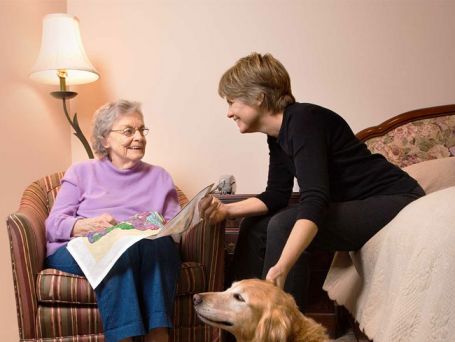Get in touch, we’re happy to discuss your needs and advise you on how best to broach this difficult subject.
How to Talk about Home Care with Your Loved Ones
It can be very difficult to broach the subject of home care services with elderly relatives, but there are a few ways of approaching this difficult discussion that will help make it easier.
People have been butting heads with their elderly parents and grandparents over the issue of home care for generations. Such antagonistic discussions are exactly what you want to avoid. The name of the game is, after all, ensuring the ongoing well-being, independence, and health of your loved ones.

It can often feel like an argument waiting to happen, and it’s natural to put the discussion off as long as possible. But leaving it too long can have negative results for both you and your loved ones.
Whether it’s a parent, relative, or even a family friend, make sure you take into account that with age comes an increased inability (or at least difficulty) performing normal, everyday tasks we take for granted. The longer you leave it to discuss home care services, the longer your loved one is struggling to cope, and the more their ability to cope is degenerating.
Difficulties range from the ability to prepare healthy food and manage their personal hygiene, to keeping their clothes and abodes clean and tidy. Another worrisome issue that crops up with age is loneliness. These problems are unpleasant for your loved one to deal with, but also place an additional (often stressful and upsetting) burden upon you.
In order to reach a mutually acceptable solution, you need to have a meaningful discussion.
Here’s how to broach the subject of home care with your elderly relatives.
Look At It From Their Perspective
Before launching into this discussion, it’s vital you consider their perspective. Certain things make seem irrational to you, and you may view their inability to see a point, or agree with you, as simple stubbornness or being ‘set in their ways’. But there are very real concerns for an elderly person when it comes to accepting home care, including the loss of independence, or the inability to accept being viewed as ‘old’. Such concerns are both understandable and valid.
When it comes to the crunch, most people want to remain in their own home, in charge of their own lives and looking after their own affairs for as long as possible. It’s important you pin down exactly what they are worried about and try to understand it.
The Silent Generation
The majority of elderly individuals currently in need of home care services are from the ‘silent generation’. Where other generations got fun nicknames like ‘baby boomers’ and ‘millennials’, the silent generation were so-called because of their reticence to being open and vocal about their personal feelings.
As a group, they are of the belief that it’s unseemly to speak of such things, or that it’s simply something you deal with yourself, without burdening others. This is particularly true of their children, and there is a great reluctance in this generation to discuss upsetting issues with family members.
The unfortunate side effect is that they unwittingly place an even greater burden on their family; by refusing to speak about things they make a difficult situation escalate, rather than simply discussing the issue and settling it.
Take Your Time
One reason to avoid putting it off is that it’s best to broach the subject gradually and talk about it over a period of time. You shouldn’t spring the notion of home care of someone without warning and expect them to adjust to the notion quickly. It’s a hard reality to face, one that takes time to sink in. They will need a period to adjust to their new reality and the realisation that home care is necessary, and that is after they have taken the time to realise what you’re suggesting is needed.
Compromise
For many elderly people, the thought of home care conjures images of nursing homes and a grisly, lonely end. It’s actually the opposite, allowing people to remain in their homes and a familiar setting, retaining as much independence as possible, while still getting the help, care and support they need. This is a vital compromise that will make the realities of old age easier to adjust to, but there are further compromises to be found.
You may want a full service with all the bells and whistles for your loved one, but it’s helpful to start small, with something they can easily see the sense and logic in. You might, for example, begin with a simple clean of their home once a week or fortnight, to help them keep on top of the chores.
Once they’re accustomed to this and happy with it, you can add in additional support, such as doing the laundry and helping them prepare meals. If you’re willing to start at a compromise and work towards your ultimate goal for them, they will find it a lot easier, and you will find it causes far fewer arguments.
Are you looking for a home care service for a loved one?
View Our
Information Categories
Require some assistance?
Our team of compassionate care specialists is ready to support you. Don’t hesitate to request a callback today for expert advice and guidance.